Talking With Children’s Book Award Winning Writer Cristina Kessler
John interviews . . .
Cristina Kessler
Cristina Kessler is an award-winning author of nine books set in Africa, where she lived for 19 years. She’s received the 2015 Lumen Award, given for “excellence in nonfiction for young readers” with Hope is Here!; She’s received the Henry Bergh Children’s Book Award from the ASPCA for Excellence in Humane Literature for Young Readers; the Africana Book Award, from the African Studies Association, honoring outstanding books about Africa for children and young adults; and has been included many times on the Notable Books for a Global Society list. She writes about nature and cross-cultural topics.
I asked Cristina what she did before the Peace Corps.
I graduated from California Polytechnic in San Luis Obispo, CA in 1972. I majored in Criminology and minored in Political Science. My first job upon graduating was working as a mushroom sorter in the Santa Cruz Mountains for four hours before I quit, due to the mess on my hands. I then began work at the juvenile hall in Santa Cruz, as a counselor. I worked both in the facility and with individual girls that had been released. I did this for a year before I joined Peace Corps in 1973. Since I was 12 years old, I knew that I wanted to travel and see the world and combined with PC it gave me the opportunity to also make a difference.
You have had several Peace C0rps tours — Honduras from 1973-75, then Kenya from 1975-76, and Seychelles from 1976-78.What did you do as a volunteer?
My first assignment was in Honduras where I was assigned to a boy’s reform school. The only women there was me, and an older American nun named Sister Rose. Every night I had boys knocking on my door and yelling, “Dame sandia,” which was prison jargon for “Sleep with me.” After I made several trips to the capital, Tegucigalpa, the Peace Corps finally decided it was an unsafe posting and came to pick me up and take me back to Tegucigalpa where I began work as a counselor in the girls’ reform school. I did this for about 6 months when Joe arrived from Peace Corps/Peru.
We had met in Training in Puerto Rico and Joe was sent to Peru and I was sent to Honduras. He managed to transfer to Tegucigalpa so we could be together. I had not joined the Peace Corps to live in a city, and so I was constantly on the lookout for a new position in the country. I located what looked like the perfect jobs for each of us, me as a community coordinator to build a five-classroom school on the island of Punta Gorda, and Joe would be the building boss since he was a Civil Engineer. The Peace Corps, however, said the only way they would send us together to small village was if we were married. We decided to get married for a year so we could go there together. (That will be 50 years ago this August!)
We enjoyed our village life and the completion of the school and went back to Tegucigalpa when we finished our two years to see if there were any options to transfer to another country.
We had both originally joined PC to work in Africa, and we eventually got posted to Kenya. Joe was an engineer on a farm-to-market road project, and I was the social worker for an orphanage in Nakuru, Kenya.
When we arrived in Kenya we saw a poster about Peace Corps/Seychelles. We asked about transferring there after Kenya, and were told we could go if we did a year in Kenya and promised to do two years in The Seychelles, which we agreed to immediately. Joe was a roads engineer, and I was a counselor for girls in a center run by UNFPA in The Seychelles .
Upon completion of our service, we spent our readjustment allowance on a 3½-year-trip that took us from The Seychelles back to Africa where we headed north on the Nile steamer through Sudan to Egypt. We then went briefly to Europe and then to the Caribbean and on to South America where we hitchhiked or took public transportation the length of the continent.
Highlights were five months in the Galapagos Islands, volunteering to tag turtles for the Darwin Research Station, and catching a ride to Antarctica with the Chilean Navy. Certainly, two rare opportunities of a lifetime.
When we were down to $18.00 we decided it was time to join the real world and get a job – overseas if possible. That’s when Joe joined CARE, and we were sent to Sierra Leone. During his 20 years with CARE we lived in Africa, Asia and Latin America. As a result, we spent 20 years in Africa, 7 years in Latin America and 2 years in Asia. We have been to all 7 continents.
What led you to write children’s and YA books?
As Joe’s career with CARE took off, I began looking for projects of my own. I decided to write books for kids, eventually five picture books, four young adult novels, and two nonfiction photography books for kids.
All of the books are set in Africa except for Hope Is Here, which is set in St. Croix in the Virgin Islands and the Arctic Circle, documenting the migration travels of a whimbrel named Hope.
 I chose to write about Africa because I wanted to show kids around the world all the things they share in common like love of family, importance of school and having goals. The books are about conservation, cultures, and animals. My books have received numerous awards including an Award for Best Children’s Writing from the Peace Corps Writers in 2002 for my book, Jubela about a true event of an old white rhino adopting a young rhino whose mother was killed by poachers. All of my books are based on true events I have witnessed. My basic goal was to share Africa with kids before they had a passport. I have 12 published books, 32 awards and recognitions, 10 books set in Africa and have been the Visiting Author in 156 schools in 17 countries.
I chose to write about Africa because I wanted to show kids around the world all the things they share in common like love of family, importance of school and having goals. The books are about conservation, cultures, and animals. My books have received numerous awards including an Award for Best Children’s Writing from the Peace Corps Writers in 2002 for my book, Jubela about a true event of an old white rhino adopting a young rhino whose mother was killed by poachers. All of my books are based on true events I have witnessed. My basic goal was to share Africa with kids before they had a passport. I have 12 published books, 32 awards and recognitions, 10 books set in Africa and have been the Visiting Author in 156 schools in 17 countries.
Tell us about publishing your first book.
My first kid’s book, One Night: A Story from the Desert, was published by Philomel, the children’s division of Penguin/Putnam. I went through the regular submission process, and was lucky to be published.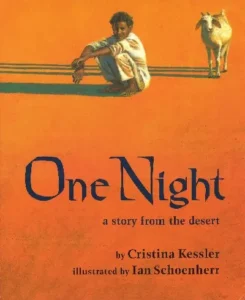
I also went to the Chautauqua Children’s Writer conference put on by Highlights for Children. This really did get my career rolling because I met my mentor there, who is my editor at Philomel, and a lot of other important and inspirational people. I’d highly recommend doing something like that.
Have you written your Peace Corps memoir?
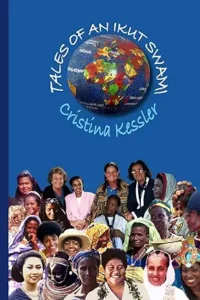 The only memoir I have written is called Tales of an Ikut Swami. This is a book celebrating women around the world. Some of the chapters are based on women I met while in Peace Corps, but the majority are women I met during Joe’s CARE days and my freedom to meet women and help organize them to pursue goals they all share, like caring for the family, making sure all kids get to school, and basically serve as the backbone of their communities.
The only memoir I have written is called Tales of an Ikut Swami. This is a book celebrating women around the world. Some of the chapters are based on women I met while in Peace Corps, but the majority are women I met during Joe’s CARE days and my freedom to meet women and help organize them to pursue goals they all share, like caring for the family, making sure all kids get to school, and basically serve as the backbone of their communities.
Of all the African countries that you have lived in and visited; what nation most impressed you and why?
That’s a tough question. I have been to 111 countries around the world. Each country had something unique to make it stand out. I loved Botswana for its pristine natural condition and political stability. Mali was spectacular and the setting of my YA novel, Trouble in Timbuktu, written long before the idiot marauders went into the ancient city and destroyed many of the beautiful, historical mosques and burned thousands of the ancient manuscripts stored there. By far, Africa is where my fondest memories are.
Based on your experience in Africa, do you think Peace Corps Volunteers have made a difference?
Definitely. In so many African countries foreign assistance was dependent on working with the men. The Peace Corps opened countless opportunities for women to pursue and realize their goals. I truly believe that Peace Corps is one of the best programs ever created by the US government. Perhaps not on a macro level, but certainly on a micro level. I have met many people who felt their experience, or relationship, with a PCV had a significant impact on their lives.
Of all the Peace Corps writers you have read, who stands out as your favorite?
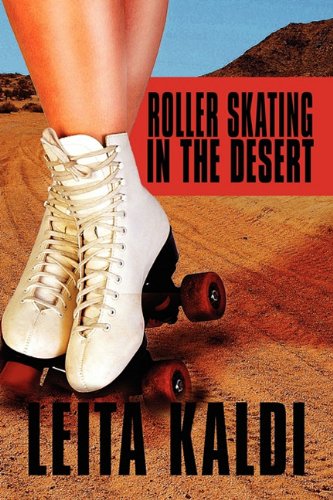 My favorite memoir written by a volunteer is Roller Skating in the Desert by Leita Kaldi Davis (Senegal 1993–96). I am impressed with her joining the Peace Corps at the age of 55 and going to Senegal for three years. I recently had the great pleasure of meeting Leita and we hit it off immediately and have been come great friends. (She sends you her regards John!)
My favorite memoir written by a volunteer is Roller Skating in the Desert by Leita Kaldi Davis (Senegal 1993–96). I am impressed with her joining the Peace Corps at the age of 55 and going to Senegal for three years. I recently had the great pleasure of meeting Leita and we hit it off immediately and have been come great friends. (She sends you her regards John!)
What’s your next book about, or have you even decided?
I am thinking about finishing my fifth YA novel called Touch. It’s based on a young African friend, Wavho, whose life was changed drastically when her mother died from AIDS back when the disease swept through Africa.
Thank you, Cristina
• • •
Visit Cristina’s website: www.cristinakessler.com
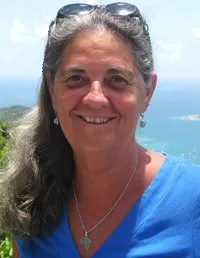
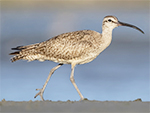
No comments yet.
Add your comment